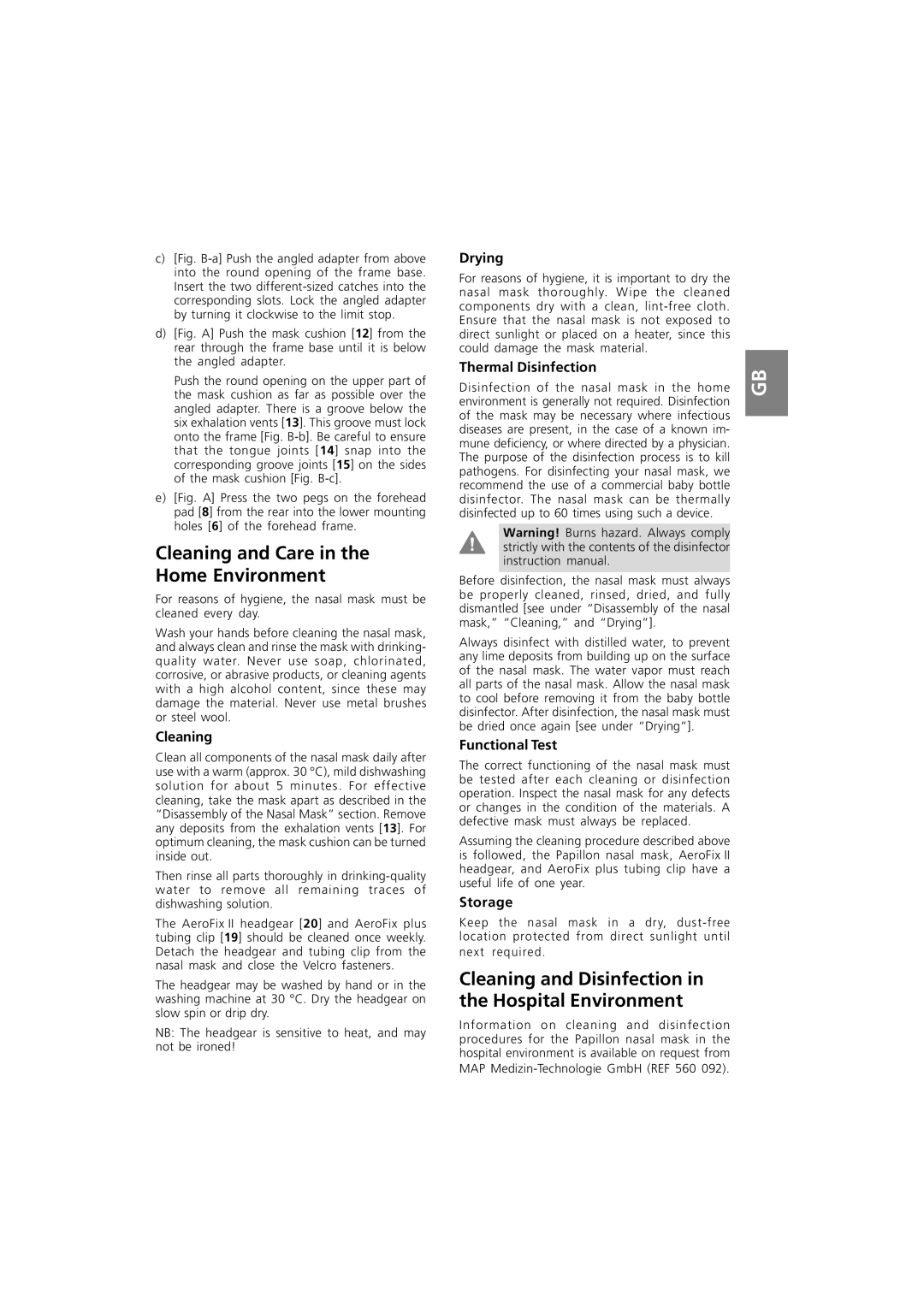
c)[Fig. B-a] Push the angled adapter from above into the round opening of the frame base. Insert the two different-sized catches into the corresponding slots. Lock the angled adapter by turning it clockwise to the limit stop.
d)[Fig. A] Push the mask cushion [12] from the rear through the frame base until it is below the angled adapter.
Push the round opening on the upper part of the mask cushion as far as possible over the angled adapter. There is a groove below the six exhalation vents [13]. This groove must lock onto the frame [Fig. B-b]. Be careful to ensure that the tongue joints [14] snap into the corresponding groove joints [15] on the sides of the mask cushion [Fig. B-c].
e)[Fig. A] Press the two pegs on the forehead pad [8] from the rear into the lower mounting holes [6] of the forehead frame.
Cleaning and Care in the Home Environment
For reasons of hygiene, the nasal mask must be cleaned every day.
Wash your hands before cleaning the nasal mask, and always clean and rinse the mask with drinking- quality water. Never use soap, chlorinated, corrosive, or abrasive products, or cleaning agents with a high alcohol content, since these may damage the material. Never use metal brushes or steel wool.
Cleaning
Clean all components of the nasal mask daily after use with a warm (approx. 30 °C), mild dishwashing solution for about 5 minutes. For effective cleaning, take the mask apart as described in the “Disassembly of the Nasal Mask” section. Remove any deposits from the exhalation vents [13]. For optimum cleaning, the mask cushion can be turned inside out.
Then rinse all parts thoroughly in
The AeroFix II headgear [20] and AeroFix plus tubing clip [19] should be cleaned once weekly. Detach the headgear and tubing clip from the nasal mask and close the Velcro fasteners.
The headgear may be washed by hand or in the washing machine at 30 °C. Dry the headgear on slow spin or drip dry.
NB: The headgear is sensitive to heat, and may not be ironed!
Drying
For reasons of hygiene, it is important to dry the nasal mask thoroughly. Wipe the cleaned components dry with a clean,
Thermal Disinfection
Disinfection of the nasal mask in the home environment is generally not required. Disinfection of the mask may be necessary where infectious diseases are present, in the case of a known im- mune deficiency, or where directed by a physician. The purpose of the disinfection process is to kill pathogens. For disinfecting your nasal mask, we recommend the use of a commercial baby bottle disinfector. The nasal mask can be thermally disinfected up to 60 times using such a device.
Warning! Burns hazard. Always comply strictly with the contents of the disinfector instruction manual.
Before disinfection, the nasal mask must always be properly cleaned, rinsed, dried, and fully dismantled [see under “Disassembly of the nasal mask,” “Cleaning,” and “Drying”].
Always disinfect with distilled water, to prevent any lime deposits from building up on the surface of the nasal mask. The water vapor must reach all parts of the nasal mask. Allow the nasal mask to cool before removing it from the baby bottle disinfector. After disinfection, the nasal mask must be dried once again [see under “Drying”].
Functional Test
The correct functioning of the nasal mask must be tested after each cleaning or disinfection operation. Inspect the nasal mask for any defects or changes in the condition of the materials. A defective mask must always be replaced.
Assuming the cleaning procedure described above is followed, the Papillon nasal mask, AeroFix II headgear, and AeroFix plus tubing clip have a useful life of one year.
Storage
Keep the nasal mask in a dry,
Cleaning and Disinfection in the Hospital Environment
Information on cleaning and disinfection procedures for the Papillon nasal mask in the hospital environment is available on request from MAP
GB
